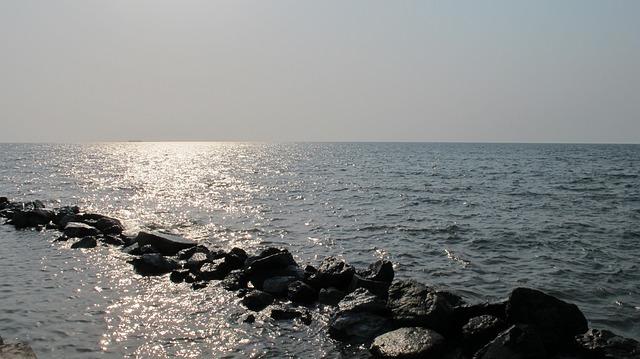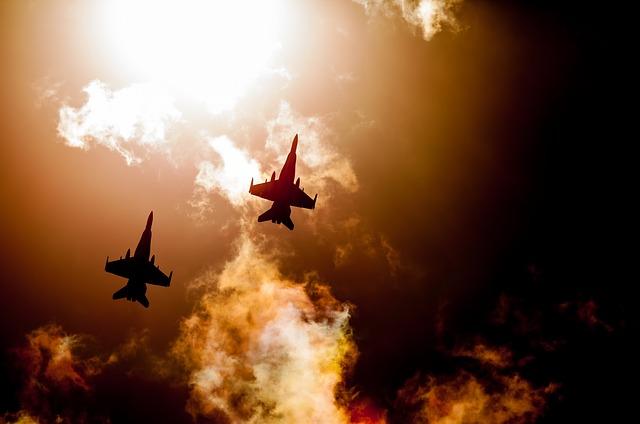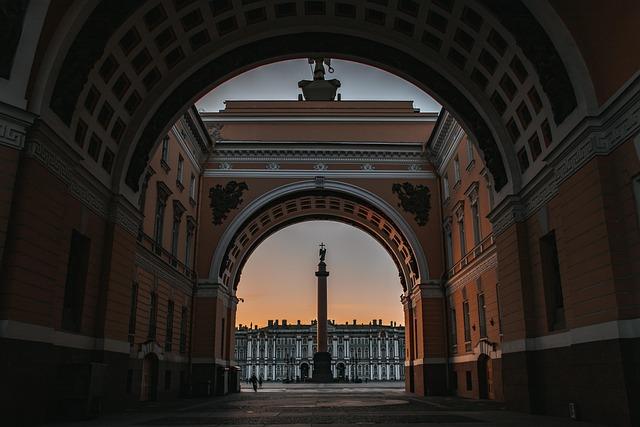Equatorial Guinea: Expansion of Russian Military Presence – Medafrica Times
In recent months, Equatorial guinea has emerged as a focal point of geopolitical interest as the nation invites an increased Russian military presence within its borders.This growth raises important questions about the implications for regional stability, international relations, and the balance of power in Central Africa. As Western nations maintain a watchful eye on Moscow’s global ambitions,Equatorial Guinea’s decision reflects a broader trend of African countries reevaluating their security partnerships amid shifting global alliances. This article delves into the motivations behind this expansion, the reactions of international stakeholders, and the potential consequences for Equatorial Guinea and its neighbors. As the dynamics of global power continue too evolve, the spotlight on Equatorial guinea serves as a critical case study of military collaboration and its far-reaching implications.
Implications of Increased Russian Military Activity in Equatorial Guinea
The rise in Russian military presence in Equatorial Guinea is likely to have significant ramifications not only for regional stability but also for international relations. As Russian forces establish a foothold in this strategically located country, the implications may include:
- Heightened Tensions: Increased military activity can lead to heightened tensions with western powers, particularly the United States and European nations, who may perceive it as a threat to their interests in Africa.
- Geopolitical Alliances: This presence might encourage the formation of new geopolitical alliances, redefining the balance of power in the Gulf of Guinea and possibly emboldening other nations to seek similar partnerships.
- Impact on Local politics: The infusion of foreign military influence could impact equatorial Guinea’s internal politics,possibly empowering certain factions within the government or military.
- Economic Consequences: The military engagement may also affect foreign investments, particularly in oil and gas sectors, as companies could reassess risk factors associated with increased military presence.
Moreover,the implications extend beyond military considerations to encompass broader socio-economic factors,such as:
| Aspect | potential Effects |
|---|---|
| Trade Relations | Possible enhancement of trade agreements between Equatorial Guinea and Russia,affecting imports and exports. |
| Human Rights Concerns | Increased scrutiny from international organizations regarding militarization and human rights practices in the country. |
| Environmental Impact | Potential environmental risks associated with increased military activity, especially in sensitive coastal areas. |

Strategic Partnerships: Equatorial Guinea and Russia’s Defense Collaboration
The burgeoning alliance between Equatorial Guinea and Russia signals a notable shift in West african defense dynamics. This strategic partnership has been bolstered by high-level visits and military dialogues, paving the way for a deeper collaboration in various sectors.Noteworthy elements of this collaboration include:
- Joint Military exercises: Regular training operations to enhance tactical capabilities.
- Defense Equipment Procurement: Supply of modern military hardware from Russia to Equatorial Guinea.
- Intelligence Sharing: Enhanced cooperation to combat regional security threats.
- Training Programs: Russian military advisors providing training to Equatorial Guinea’s armed forces.
This partnership not only strengthens Equatorial guinea’s military capabilities but also shifts the regional balance of power through increased Russian influence. the collaboration extends beyond mere military engagement, impacting economic and political relations as Equatorial Guinea seeks to assert its sovereignty amidst foreign interests. The implications of these ties can be summarized as follows:
| Aspect | Implications |
|---|---|
| Military Modernization | Upgrading defense systems and capabilities. |
| Geopolitical Influence | Increased Russian presence as a counterbalance to Western powers. |
| Regional security | Potential to stabilize or destabilize neighboring countries. |

Economic Consequences of Military Expansion on Local Communities
The increased presence of the russian military in Equatorial Guinea is poised to bring significant economic transformations, both productive and disruptive, to local communities. On one hand, the infusion of military personnel is likely to generate demand for local goods and services, stimulating businesses that cater to this new consumer base.This demand can lead to job creation in various sectors, such as hospitality, retail, and transportation. Residents may find opportunities in the burgeoning economy sparked by military expenditures, fostering a semblance of economic stability, particularly in regions that have historically relied on subsistence farming and small-scale commerce.
Though, the long-term economic consequences remain uncertain and could jeopardize the fabric of local communities. The prioritization of military infrastructures, such as bases and supply stations, may divert funds and resources from essential social services, such as education and healthcare. Additionally, with the influx of military personnel, property prices could surge, creating a divide between long-standing residents and new arrivals. This shift can lead to inflationary pressures on basic goods, making it increasingly arduous for local populations to afford necessities. The potential for social unrest cannot be overlooked, as communities grapple with the contrasting economic impacts brought about by military expansion.

Regional Security Dynamics: how Russia’s Presence Alters West African Stability
Russia’s growing military footprint in Equatorial Guinea is reshaping the security landscape of West Africa, creating a ripple effect that influences regional stability. This escalated presence is not merely about military drills or the establishment of bases; it signals a strategic alignment with local regimes aiming to bolster their governance and security apparatus. In a region plagued by historical conflicts and emerging terrorist threats,Russia positions itself as a crucial ally to various West African nations by offering security agreements and military equipment. This partnership tends to promote a complex interplay of interests, where local governments may rely on Russian support while concurrently alienating Western influence, further complicating diplomatic relations within the region.
As West African countries navigate this new geopolitical environment, they must consider several critical factors:
- Shifting alliances: The influx of Russian military advisers and resources could encourage nations to pivot away from traditional Western partnerships.
- Counterterrorism Efforts: With many countries facing insurgencies, Russia’s military assistance may shift the focus and methodology in combatting these threats.
- Regional Power Dynamics: The presence of a foreign military player alters the balance of power, prompting neighboring states to reassess their own military and diplomatic strategies.
to further illustrate the nuances of this dynamic, a brief assessment of key countries involved in enhancing military cooperation with Russia is presented below:
| Country | Type of Cooperation | Current Military Engagements |
|---|---|---|
| Equatorial guinea | Defense Agreements | Joint military drills, arms supplies |
| Congo-Brazzaville | Military Training | Training local forces, logistical support |
| Central African Republic | Security Assistance | Advisory roles, combat support against insurgents |

Recommendations for Equatorial Guinea’s Diplomatic Strategy Moving forward
Considering the expanding Russian military presence in Equatorial Guinea, the nation must reassess its diplomatic strategies to align with its evolving geopolitical landscape. Strengthening relationships with traditional allies and exploring new partnerships is essential for maintaining regional stability and economic growth. This could involve:
- Engaging with Western nations to diversify military assistance and funding sources.
- Enhancing cooperation with neighboring African states to promote shared security interests.
- Fostering dialog with international organizations to leverage diplomatic channels effectively.
Such initiatives would not only curtail growing external influences but also reinforce Equatorial Guinea’s sovereignty in diplomatic interactions.
Moreover, an emphasis on economic diplomacy can fortify the nation’s position on the global stage. By capitalizing on its rich natural resources, Equatorial Guinea can attract foreign investment while crafting balanced agreements that respect both national interests and international obligations. The strategy could encompass:
- Creating transparent policies that build investor confidence.
- Formulating bilateral trade agreements to secure economic partnerships.
- Promoting tourism and lasting development initiatives to diversify the economy.
By adopting these approaches, Equatorial Guinea can elevate its diplomatic standing and navigate the complexities of foreign military involvement with prudence and strategy.

The Role of International Oversight in Equatorial Guinea’s Military Relations
The geopolitical landscape of Equatorial Guinea has undergone significant transformation with the expansion of Russian military presence in the region. This development raises critical questions regarding the role of international oversight. Monitoring bodies, such as the United Nations and various regional organizations, are essential to ensure that military collaborations adhere to international law and respect human rights. Furthermore, these entities can help maintain a delicate balance among the interests of foreign powers while safeguarding the sovereignty and security of Equatorial Guinea.
International oversight can play a pivotal role in shaping military relations by emphasizing openness and encouraging accountability in defense agreements. For example, stakeholders could benefit from an evaluation framework that emphasizes:
- Humanitarian implications of military engagements
- Environmental impacts due to military activities
- Compliance with international treaties and human rights standards
In light of the growing tensions within the region, it is imperative for these oversight bodies to facilitate dialogue among nations involved in military partnerships, ensuring that Equatorial Guinea’s interests are represented and prioritized.This collaborative approach is necessary to navigate the complexities of military dynamics, fostering an environment that is conducive to peace and sustainable development.

In Summary
the expansion of the Russian military presence in Equatorial Guinea marks a significant development in the geopolitics of Central Africa. This growing collaboration reflects not only russia’s strategic interests in the region but also the complex dynamics at play as nations navigate their security partnerships amid shifting global power structures. As Equatorial Guinea positions itself as a pivotal player in this alliance, the implications for regional stability, economic ties, and international relations warrant close observation.With more military engagements anticipated, stakeholders and observers alike will be keen to monitor how this partnership evolves and its potential impact on the broader African geopolitical landscape. The unfolding situation underscores the importance of understanding local contexts while acknowledging the broader continental and global implications of such military collaborations.







